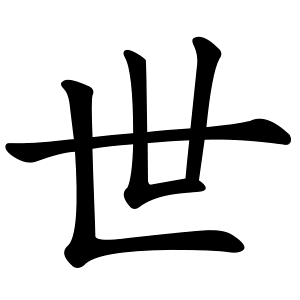世
- world;
- generation;
- lifetime;
By extension, it can mean a thirty-year period (a traditional reckoning of a generation’s length).
Etymology
There are two main scholarly views on the origin of 世:
1️. Leaf interpretation:
Some scholars see 世 as a pictograph of leaves attached to branches.
From this, the cycle of old leaves falling and new leaves sprouting symbolized generational change, giving the meaning “generation.”
This also explains why 葉 (leaf) contains 世.
2️. Numeric interpretation:
Others argue 世 is a numerical ideograph meaning “thirty” (卅).
It shows three 十 (ten) stacked, representing 30 years = one generation.
This theory is supported by the fact that 世 is rarely found meaning “leaf” in ancient texts.
Additional notes
Emperor Taizong of Tang (당태종)’s personal name was 이세민 (李世民).
The character 世 became taboo; many words and names replaced 世 with 代 (similar meaning). After Tang’s fall, 世 returned to normal usage.
Because the taboo created widespread confusion, later monarchs chose obscure characters (僻字) for their names to avoid such disruptions — though some still caused conflicts.
There was once debate in Korean genealogy about how 世 and 代 should be counted:
- Some claimed 代 counts ancestors while 世 counts descendants;
- Others proposed 代 excluded the self, while 世 included it.
These distinctions are largely abandoned today.
Words that derived from 世
- 구세주(救世主)–Savior
- 근세(近世)–early modern times
- 내세(來世)–life to come; future life; life after death
- 다세대(多世帶)–multi-unit house
- 만세(萬世)–future
- 말세(末世)–eschatology; end times; The Last Days
- 세(世)–A bound noun that serves as a unit indicating a person's position in a family lineage or a king's position in a succession of kings in a dynasty
- 세계(世界)–world; universe; circle; community
- 세계 대전(世界大戰)–world war
- 세계 지도(世界地圖)–world map
- 세계관(世界觀)–world view
- 세계사(世界史)–world history
- 세계평화통일가정연합(世界平和統一家庭聯合)–Family Federation for World Peace and Unification
- 세기(世紀)–century
- 세상(世上)–world; world outside; secular world; life; being really; being never
- 세속(世俗)–mundane world; secular world; popular customs
- 세속화(世俗化)–secularization
- 중세(中世)–the Middle Ages
- 창세(創世)–creation of the world
- 출세(出世)–success; being successful
- 피조세계(被造世界)–created world
- 현세(現世)–this world; real world; today's world; mundane world
- 후세(後世)–posterity; next generation; life to come; future life; life after death
